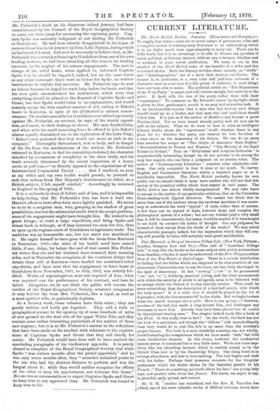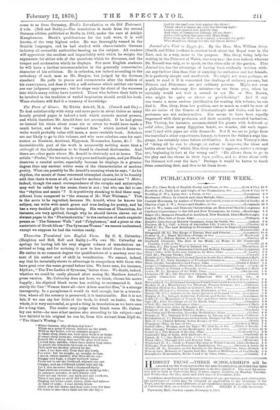Fair Harvard : a Story of American College Life. (New
York, Putnam ; London, Sampson Low and Co.).—This tale of "American College Life " is very like the books on the same subject with which we have here been familiar,—books, it must be understood, of the Peter Priggins rather than of the Tom Brown at Oxford type. There is a certain satisfaction in finding that the follies which are supposed to be characteristic of our aristocratic Universities are, to say the least, not less fully developed in the land of democracy. In fact " rowing " (" ow " to be pronounced " ou," not "o " ), drinking, practical joking, and the other amusements with which the severity of study is mitigated, seem to bo followed with an energy which the Oxford of to-day scarcely retains. What could be more astonishing than the description of a foot-ball match, with which the book opens? It is a trifle that it should be played ou the 1st of September, with the thermometer 84° in the shade. But we begin to stare when the match changes into a melee. Here is one group :—" Seaborn, careless of the ball, has made a ring around him, and challenges any freshman to meet him. Already four have been placed hors de combat by the stalwart boating man." The chapter indeed reads like a book of the Iliad Is this really true to fact ? On the whole, the book has not the look of a caricature, and though the "fellows " talk more brilliantly than they would do in real life, this is no more than the novelist's proper licence. The book is a most decidedly amusing one, not wholly, notwithstanding the comparisons which we have made, "fast," bat with some intellectual interest. In this latter, however, the academical system seems to command but a very little share. We do not trace any, thing like the absorbing interest which is excited among us by the Oxford Class List or by the Cambridge Tripes. One thing there is in
strange abundance, and that is love-making. The tale begins and ends
with the ladies. Perhaps their presence accounts for the irregular preference which the writer shows for the feminine gender in his French: "There is something spirituelle about his face," one young lady says, and another talks about her fiancee. The Latin, we ought to say, is plentiful, aptly quoted, and correct.
Mr. G. H. enables has translated, and the Rev. E. Venables has edited, one of the most valuable works of Biblical criticism which have come to us from Germany, Bleek's Introduction to the Old Testament. 2 vols. (Bell and Daldy.)—The translation is made from the second 4Clerman edition, published at Berlin in 1865, under the care of Adolph Kamphausen. Bleek's qualifications for the task were, it is well known, of the very highest order. He was thoroughly versed in the Semitic languages, and he had studied with characteristic German industry all accessible authorities bearing on the subject. All readers will appreciate the candour and impartiality with which he weighs the arguments for either side of the questions which he discusses, and the temper and moderation which he displays. For most English students he will have a further recommendation in the generally conservative character of his criticism. He is orthodox, not indeed according to the orthodoxy of such men as Mr. Burgon, but judged by the German standard. He pulls to pieces and reconstructs after the fashion of his countrymen, and does it with a self-reliance which neither our taste nor our judgment approves ; but he stops very far short of the excesses into which many critics have hurried. Those who believe their faith to be involved in the tradition of verbal inspiration should avoid his book. Wiser students will find it a treasury of knowledge.



































 Previous page
Previous page